French actress Rosine Deréan (1910-2001) was a popular star of the French cinema of the 1930s. Her best-known films are the melodrama Les deux orphelines (1933) and the romantic drama Lac aux dames (1934). She was married to Claude Dauphin and was a member of the French Resistance during the Second World War.
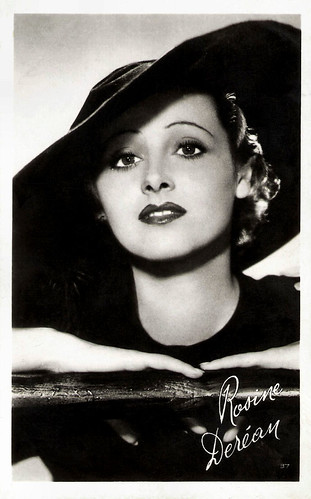
French postcard, no. 37.

French postcard, Imprimerie A. Breger Frères, Paris. Issued for the cinema Max-Linder Pathé, 24, Boulevard Poissonière, Paris, where the film was presented 14-20 September 1934. Jean-Pierre Aumont and Rosine Dérean in Lac au dames/Ladies Lake (Marc Allégret, 1934). The film is situated at Lake Konstanz. In Germany, the film was presented as Hell in Frauensee ('Frauensee' was the title of the novel by Vicki Baum the film was based on).
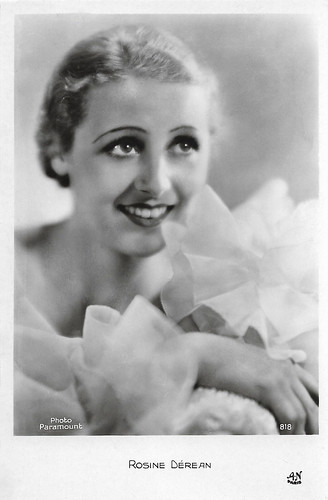
French postcard by A.N., Paris, no. 818. Photo: Paramount.
Rosine Deréan was born as Rosine Jeanne Schlotterbeck in 1910 in Paris, France. She was the daughter of actress Yane Exiane, who was a star at the Folies-Bergère and appeared in some silent films. Rosine took her stage name from the character Sophie de Réan, the naughty heroine of the children's book 'Les Malheurs de Sophie' (Sophie's Misfortunes, 1858) by the Countess of Ségur.
In 1931, without any acting training, she made her film debut opposite Harry Baur and René Lefèvre in the exotic mystery Les cinq gentlemen maudits/Moon Over Morocco (Julien Duvivier, 1931). Her career was launched, and the following year, she played in seven films. First, she appeared in the crime film Le chien jaune/The Yellow Dog (Jean Tarride, 1932), with Abel Tarride (the director's father) and Rolla Norman. It was an adaptation of the novel 'Maigret and the Yellow Dog' by the Belgian writer Georges Simenon.
She also co-starred in the drama La belle marinière/The Beautiful Sailor (Harry Lachman, 1932) starring Pierre Blanchar, Madeleine Renaud, and Jean Gabin. It was made by the French subsidiary of Paramount Pictures at the company's Joinville Studios. With Renée Saint-Cyr, she played in the historical drama Les deux orphelines/The Two Orphans (Maurice Tourneur, 1933). The film was based on the play 'The Two Orphans' which had been turned into several films. Tourneur altered the story slightly by moving it forward from the French Revolution to the Napoleonic Era.
L'or (1934) was the French-language version of the German Science-Fiction film Gold (Karl Hartl, 1934). The film involves a British scientist who is attempting to create a device that turns base materials into gold. Director Karl Hartl developed Gold after the international success of Ufa's Science-Fiction film Der Tunnel/The Tunnel (Kurt Hoffmann, 1933). Gold was Ufa's super production of that time and reportedly took 14 months to shoot. Brigitte Helm reprised her role in the French version, while Rosine Dérean replaced Lien Deyers. Serge de Poligny directed the scenes in French with the script adapted to French by Jacques Thierry.
Her next film was the French drama Lac aux dames/Ladies Lake (Marc Allégret, 1934) in which she co-starred with Jean-Pierre Aumont, Simone Simon, and Ila Meery. The film, based on a novel by Vicki Baum, was released by the French branch of Tobis Film.
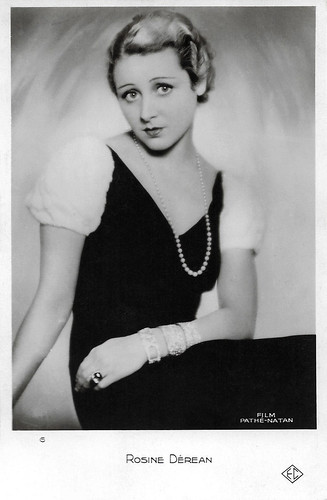
French postcard by EC (Editions Chantal, Paris), no. 6. Photo: Film Pathé-Natan.

French postcard by Erres, no. 6. Photo: Pathé Nathan.
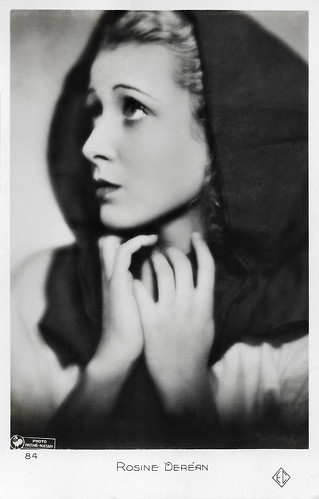
French postcard by EC (Editions Chantal), no. 84. Photo: Pathé-Natan.
Rosine Dérean played a jewel thief in Le Roman d'un tricheur/The Story of a Cheat (1936), starring, written, and directed by Sacha Guitry. It was adapted from Guitry's only novel, 'Les Mémoires d'un tricheur' (1935). Dérean also appeared in Guitry's Faisons un rêve.../Let's Make a Dream (Sacha Guitry, 1936), and Les Perles de la couronne/The Pearls of the Crown (Sacha Guitry, 1937).
In 1937, she married actor Claude Dauphin, with whom she would have a son, André Legrand-Dauphin. That year, she also had a supporting role in the crime film Arsène Lupin détective/Arsene Lupin, Detective (Henri Diamant-Berger, 1937) starring Jules Berry, Gabriel Signoret, and Suzy Prim. She then acted in a few stage productions. In 1940, she appeared as herself in the comedy Les surprises de la radio/Radio Surprises (Marcel Aboulker, 1940) starring Marguerite Moreno and Armand Bernard.
Claude Dauphin joined the Resistance during the war and moved to London in 1942 to join the Forces Françaises Libres (Free French Forces). Rosine retired to their chateau at 'La Bourdillière' in the small village of Genillé, in Touraine. A patriot and a committed resistance member, she hid English pilots there. In 1943, following a denunciation, she was arrested. Rosine was deported to the Ravensbruck concentration camp where she was a prisoner until 1945. She narrowly escaped death.
Upon her return, she separated from her husband and gradually disappeared from public life. She had a small part in the crime film L'assassin n'est pas coupable/The Murderer is Not Guilty (René Delacroix, 1946) starring Albert Préjean, Jacqueline Gauthier and Jules Berry. Her final film appearance was in Agence matrimoniale/Matrimonial Agency (Jean-Paul Le Chanois, 1952), starring Bernard Blier. In 1952 she also divorced Claude Dauphin.
She retired and ended her life in Genillé, where she lived in the former abbey of La Bourdillière. In 2001, Rosine Dérean passed away in Genillé, shortly after her 91st birthday. She was cremated at the crematorium of Esvres-les-Tours (Indre-et-Loire) and her ashes were scattered in Genillé. For her work during the war, she was decorated with the Légion d'honneur (Legion of Honour) and the Croix de Guerre avec palme (the War Cross with palm). Her son passed away in 2008. In 2009, the municipality of Genillé inaugurated a village hall in her name. In 2017, Christophe Meunier published the biography 'Rosine DEREAN, le roman d'une actrice'.
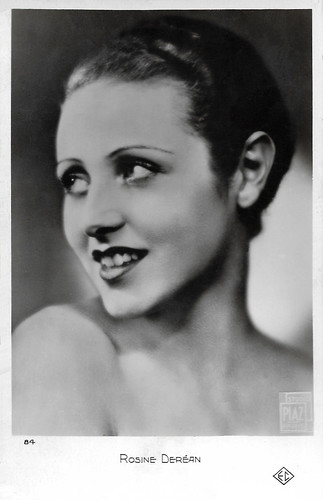
French postcard by EC, Paris, no. 84. Photo: Studio Piaz, Paris.
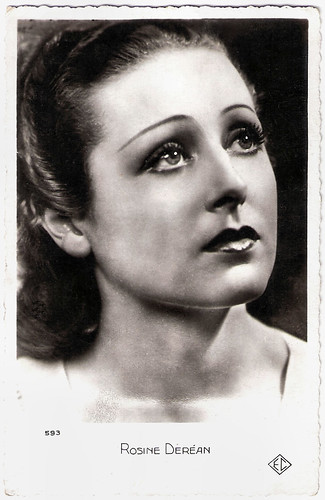
French postcard by EC, no. 593.

French postcard by P.C., Paris, no. 59. Photo: G.L. Manuel Frères.
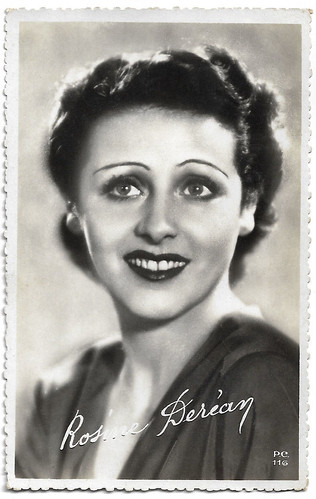
French postcard by P.C., Paris, no. 116.
Sources: Yvan Foucart (L'Encinémathèque - French), Wikipedia (French and English) and IMDb.
This post was last updated on 28 December 2023.

French postcard, no. 37.

French postcard, Imprimerie A. Breger Frères, Paris. Issued for the cinema Max-Linder Pathé, 24, Boulevard Poissonière, Paris, where the film was presented 14-20 September 1934. Jean-Pierre Aumont and Rosine Dérean in Lac au dames/Ladies Lake (Marc Allégret, 1934). The film is situated at Lake Konstanz. In Germany, the film was presented as Hell in Frauensee ('Frauensee' was the title of the novel by Vicki Baum the film was based on).

French postcard by A.N., Paris, no. 818. Photo: Paramount.
The Two Orphans
Rosine Deréan was born as Rosine Jeanne Schlotterbeck in 1910 in Paris, France. She was the daughter of actress Yane Exiane, who was a star at the Folies-Bergère and appeared in some silent films. Rosine took her stage name from the character Sophie de Réan, the naughty heroine of the children's book 'Les Malheurs de Sophie' (Sophie's Misfortunes, 1858) by the Countess of Ségur.
In 1931, without any acting training, she made her film debut opposite Harry Baur and René Lefèvre in the exotic mystery Les cinq gentlemen maudits/Moon Over Morocco (Julien Duvivier, 1931). Her career was launched, and the following year, she played in seven films. First, she appeared in the crime film Le chien jaune/The Yellow Dog (Jean Tarride, 1932), with Abel Tarride (the director's father) and Rolla Norman. It was an adaptation of the novel 'Maigret and the Yellow Dog' by the Belgian writer Georges Simenon.
She also co-starred in the drama La belle marinière/The Beautiful Sailor (Harry Lachman, 1932) starring Pierre Blanchar, Madeleine Renaud, and Jean Gabin. It was made by the French subsidiary of Paramount Pictures at the company's Joinville Studios. With Renée Saint-Cyr, she played in the historical drama Les deux orphelines/The Two Orphans (Maurice Tourneur, 1933). The film was based on the play 'The Two Orphans' which had been turned into several films. Tourneur altered the story slightly by moving it forward from the French Revolution to the Napoleonic Era.
L'or (1934) was the French-language version of the German Science-Fiction film Gold (Karl Hartl, 1934). The film involves a British scientist who is attempting to create a device that turns base materials into gold. Director Karl Hartl developed Gold after the international success of Ufa's Science-Fiction film Der Tunnel/The Tunnel (Kurt Hoffmann, 1933). Gold was Ufa's super production of that time and reportedly took 14 months to shoot. Brigitte Helm reprised her role in the French version, while Rosine Dérean replaced Lien Deyers. Serge de Poligny directed the scenes in French with the script adapted to French by Jacques Thierry.
Her next film was the French drama Lac aux dames/Ladies Lake (Marc Allégret, 1934) in which she co-starred with Jean-Pierre Aumont, Simone Simon, and Ila Meery. The film, based on a novel by Vicki Baum, was released by the French branch of Tobis Film.

French postcard by EC (Editions Chantal, Paris), no. 6. Photo: Film Pathé-Natan.

French postcard by Erres, no. 6. Photo: Pathé Nathan.

French postcard by EC (Editions Chantal), no. 84. Photo: Pathé-Natan.
The Story of a Cheat
Rosine Dérean played a jewel thief in Le Roman d'un tricheur/The Story of a Cheat (1936), starring, written, and directed by Sacha Guitry. It was adapted from Guitry's only novel, 'Les Mémoires d'un tricheur' (1935). Dérean also appeared in Guitry's Faisons un rêve.../Let's Make a Dream (Sacha Guitry, 1936), and Les Perles de la couronne/The Pearls of the Crown (Sacha Guitry, 1937).
In 1937, she married actor Claude Dauphin, with whom she would have a son, André Legrand-Dauphin. That year, she also had a supporting role in the crime film Arsène Lupin détective/Arsene Lupin, Detective (Henri Diamant-Berger, 1937) starring Jules Berry, Gabriel Signoret, and Suzy Prim. She then acted in a few stage productions. In 1940, she appeared as herself in the comedy Les surprises de la radio/Radio Surprises (Marcel Aboulker, 1940) starring Marguerite Moreno and Armand Bernard.
Claude Dauphin joined the Resistance during the war and moved to London in 1942 to join the Forces Françaises Libres (Free French Forces). Rosine retired to their chateau at 'La Bourdillière' in the small village of Genillé, in Touraine. A patriot and a committed resistance member, she hid English pilots there. In 1943, following a denunciation, she was arrested. Rosine was deported to the Ravensbruck concentration camp where she was a prisoner until 1945. She narrowly escaped death.
Upon her return, she separated from her husband and gradually disappeared from public life. She had a small part in the crime film L'assassin n'est pas coupable/The Murderer is Not Guilty (René Delacroix, 1946) starring Albert Préjean, Jacqueline Gauthier and Jules Berry. Her final film appearance was in Agence matrimoniale/Matrimonial Agency (Jean-Paul Le Chanois, 1952), starring Bernard Blier. In 1952 she also divorced Claude Dauphin.
She retired and ended her life in Genillé, where she lived in the former abbey of La Bourdillière. In 2001, Rosine Dérean passed away in Genillé, shortly after her 91st birthday. She was cremated at the crematorium of Esvres-les-Tours (Indre-et-Loire) and her ashes were scattered in Genillé. For her work during the war, she was decorated with the Légion d'honneur (Legion of Honour) and the Croix de Guerre avec palme (the War Cross with palm). Her son passed away in 2008. In 2009, the municipality of Genillé inaugurated a village hall in her name. In 2017, Christophe Meunier published the biography 'Rosine DEREAN, le roman d'une actrice'.

French postcard by EC, Paris, no. 84. Photo: Studio Piaz, Paris.

French postcard by EC, no. 593.

French postcard by P.C., Paris, no. 59. Photo: G.L. Manuel Frères.

French postcard by P.C., Paris, no. 116.
Sources: Yvan Foucart (L'Encinémathèque - French), Wikipedia (French and English) and IMDb.
This post was last updated on 28 December 2023.
No comments:
Post a Comment